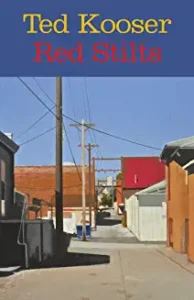Red Stilts: Poems by Ted Kooser 2020
Kooser, an octogenarian from Nebraska, has written 15 books of poetry along with a number of non-fiction and children’s books and though honored with a Pulitzer and a four year term as U.S. Poet Laureate, remains relatively unknown.
If you aren’t acquainted with his work, rush out and buy this book or at least take it out of the library as I did. The poems are a delightful treat and an escape from the messy world of today as Kooser takes us back to his childhood in rural Iowa and the simple pleasures of small towns, farms, and the beauty of nature right outside one’s door. Something as simple as a band concert in the summer of a Depression year yields detailed memories of sights, sounds, smells that transport Kooser back to that time. (“You have to imagine all this, as I have,/for I was only a child in those years./Imagine Dick Day, the town’s bandmaster,/in his black-billed cap, black uniform/with yellow piping running down the legs,/the fish-like mouths of the flashing trombones/appearing as if they were trying to catch/the little white tip of his flying baton.”
There is much to love in these short, free verse poems, and my favorites are the ones about the natural world that Kooser loves in his Midwestern plains town. A great blue heron, a bat, a dead vole, a vulture, a tree frog—each of these leads him to spin a beautiful web of words that makes them come alive, accessible to even today’s urban dweller, A favorite is his poem about a ‘Roadside Cemetery’ in which some headstones which had fallen and broken had been moved to lean against some ancient Scots pines. One day, the trees and their stumps have all been removed and the stones moved. Kooser writes: “I had to shade my eyes to find those stones/I felt were mine, stacked up like phone books/by the fence, with lichens burning like a field/of wheat on top of the topmost stone, arranged/in three pieces, the inscription turned down.”
Kooser is an American treasure. My favorite book of his is one entitled “Winter Morning Walks: One Hundred Postcards to Jim Harrison.” He had me at postcards, but the brief, daily messages written to his good friend and fellow poet, Harrison, are a human expression of his joy in the natural world as well as his fear of dying during a period of chemotherapy. They’re definitely worth reading, as is Red Stilts.



